Reviews



-
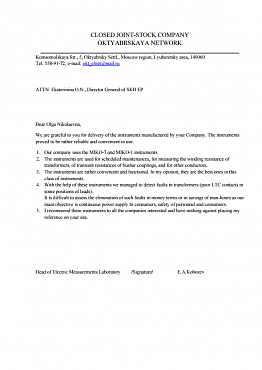 Open
Open
CJSC OKTYABRSKAYA NETWORK
We are grateful to you for delivery of the instruments manufactured by your Company. The instruments proved to be rather reliable and convenient in use.
Our company uses the MIKO-7 and MIKO-1 instruments. The instruments are used for scheduled maintenances, for measuring the winding resistance of transformers, of transient resistances of busbar couplings, and for other conductors.
The instruments are rather convenient and functional. In my opinion, they are the best ones in this class of instruments.
With the help of these instruments we managed to detect faults in transformers (poor LTC contacts in some positions of leads). It is difficult to assess the elimination of such faults in money terms or in savings of man-hours as our main objective is continuous power supply to consumers, safety of personnel and consumers.
I recommend these instruments to all the companies interested.
-
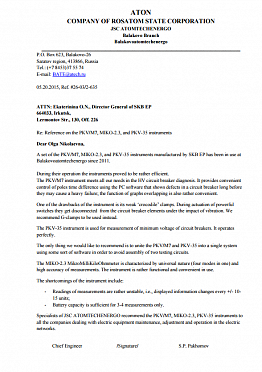 Open
Open
JSC ATOMTECHENERGO Balakovo Branch Balakovoatomtechenergo
A set of the PKV/M7, MIKO-2.3, and PKV-35 instruments manufactured by SKB EP has been in use at Balakovoatomtechenergo since 2011.
During their operation the instruments proved to be rather efficient.
The PKV/M7 instrument meets all our needs in the HV circuit breaker diagnosis. It provides convenient control of poles time difference using the PC software that shows defects in a circuit breaker long before they may cause a heavy failure; the function of graphs overlapping is also rather convenient.
The PKV-35 instrument is used for measurement of minimum voltage of circuit breakers. It operates perfectly.
The MIKO-2.3 MikroMilliKiloOhmmeter is characterized by universal nature (four modes in one) and high accuracy of measurements. The instrument is rather functional and convenient in use.
Specialists of JSC ATOMTECHENERGO recommend the PKV/M7, MIKO-2.3, PKV-35 instruments to all the companies dealing with electric equipment maintenance, adjustment and operation in the electric networks.
-
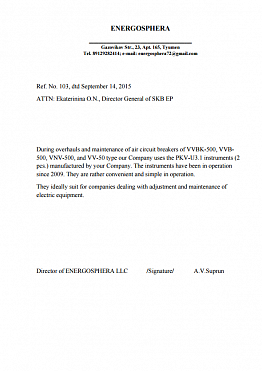 Open
Open
ENERGOSPHERA, LLS
During overhauls and maintenance of air circuit breakers of VVBK-500, VVB-500, VNV-500, and VV-50 type our Company uses the PKV-U3.1 instruments (2 pcs.) manufactured by your Company. The instruments have been in operation since 2009. They are rather convenient and simple in operation.
They ideally suit for companies dealing with adjustment and maintenance of electric equipment.
-
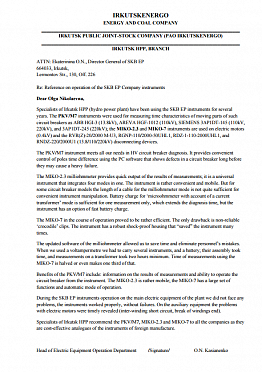 Open
Open
Branch IRKUTSKENERGO PJSC IRKUTSK HPP
Specialists of Irkutsk HPP (hydro power plant) have been using the SKB EP instruments for several years. The PKV/M7 instruments were used for measuring time characteristics of moving parts of such circuit breakers as ABB HGI-3 (13.8kV), AREVA HGF-1012 (110kV), SIEMENS 3AP1DT-145 (110kV, 220kV), and 3AP1DT-245 (220kV); the MIKO-2.3 and MIKO-7 instruments are used on electric motors (0.4kV) and the RVR(Z)-20/2000 M-U3, RGNP-110/2000-50UHL1, RDZ-1-110-2000UHL1, and RNDZ-220/2000U1 (13.8/110/220kV) disconnecting devices.
The PKV/M7 instrument meets all our needs in HV circuit breaker diagnosis. It provides convenient control of poles time difference using the PC software that shows defects in a circuit breaker long before they may cause a heavy failure.
The MIKO-2.3 milliohmmeter provides quick output of the results of measurements; it is a universal instrument that integrates four modes in one. The instrument is rather convenient and mobile. But for some circuit breaker models the length of a cable for the milliohmmeter mode is not quite sufficient for convenient instrument manipulation. Battery charge for ‘microohmmeter with account of a current transformer’ mode is sufficient for one measurement only, which extends the diagnosis time, but the instrument has an option of fast battery charge.
The MIKO-7 in the course of operation proved to be rather efficient. The only drawback is non-reliable "crocodile" clips. The instrument has a robust shock-proof housing that “saved” the instrument many times.
The updated software of the milliohmmeter allowed us to save time and eliminate personnel’s mistakes. When we used a voltampermetre we had to carry several instruments, and a battery; their assembly took time, and measurements on a transformer took two hours minimum. Time of measurements using the MIKO-7 is halved or even makes one third of that.
Benefits of the PKV/M7 include: information on the results of measurements and ability to operate the circuit breaker from the instrument. The MIKO-2.3 is rather mobile; the MIKO-7 has a large set of functions and automatic mode of operation.
During the SKB EP instruments operation on the main electric equipment of the plant we did not face any problems, the instruments worked properly, without failures. On the auxiliary equipment the problems with electric motors were timely revealed (inter-winding short circuit, break of windings end).
Specialists of Irkutsk HPP recommend the PKV/M7, MIKO-2.3 and MIKO-7 to all the companies as they are cost-effective analogues of the instruments of foreign manufacture.
-
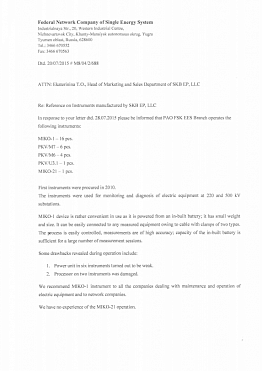 Open
Open
Federal Network Company of Single Energy System
That PAO FSK EES Branch operates the following instruments: MIKO-1 (16 pcs.), PKV/M7 (6 pcs.), PKV/M6 (4 pcs.), PKV/U3.1 (1 pcs.), MIKO-21 (1 pcs.).
First instruments were procured in 2010. The instruments were used for monitoring and diagnosis of electric equipment at 220 and 500 kV substations.
MIKO-1 device is rather convenient in use as it is powered from an in-built battery; it has small weight and size. It can be easily connected to any measured equipment owing to cable with clamps of two types. The process is easily controlled, measurements are of high accuracy; capacity of the in-built battery is sufficient for a large number of measurement sessions.
We used PKV/M6 and PKV/M7 instruments for recording the time and speed characteristics of circuit breakers U-110, MKP-110, U-220, VMT-110, VMT-220, MKP-35, C-35, and of 6-10kV oil circuit breakers. The process of connection and diagnosis is rather simple.
We recommend PKV/M6 and PKV/M7 instruments to all the companies dealing with maintenance and operation of electric equipment and to electric network companies.

 Русский
Русский
 English
English
 Français
Français